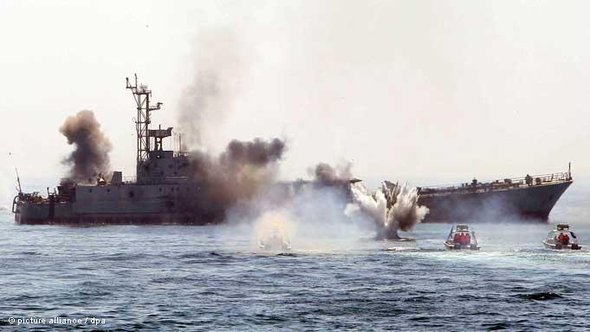The Pasdaran Holds the Reins of Power
Mr. Nirumand, the "Sepah Pasdaran", the Revolutionary Guards in Iran, was founded in 1979. It functions separately from the regular army and its mission – at least officially – is "to protect the values of the Islamic revolution and the basis of the Islamic state." Since then, its mission and powers have been extended enormously. Can the Revolutionary Guards be described as the true rulers in Iran?
Nirumand: Yes. In fact, there has never been such a concentration of power as this in Iran's entire recent history. Today the "Sepah Pasdaran" is the most powerful authority in Iran – politically, economically, and militarily.
The regular army plays a very secondary role to the Pasdaran, which is armed with the most modern weapons. It is very powerful and it decides on all military questions, while the regular army has receded completely into the background.
So the Pasdaran is well-armed. Is it also prepared for a potential military strike by Israel? After all, there have been plenty of verbal threats in the past few years.

Nirumand: I think it is prepared. Iran has many, many ways of defending itself. It's obvious which targets might be attacked. It has modern rockets and warships and is very capable of inflicting damage on the US or other states.
The Pasdaran has always had a military presence, but how has its economic power changed?
Nirumand: It is now considered the biggest economic power in the country. For one thing, the Pasdaran receives concessions for all large infrastructure projects in Iran. Whether it's dams, road-building or the construction of ports or airports, the Pasdaran is involved in all major projects.
On top of that, it controls the ports and airports – and therefore the whole market – imports and exports and above all the black market. It can bring goods into the country or take them out without paying duties or taxes. The Pasdaran is also involved in oil projects. It's incredible the things that the Pasdaran has brought under its economic control.
What role does the Pasdaran play in the conflict with the West over Iran's nuclear ambitions?
Nirumand: The Pasdaran is directly involved in decision-making, not only on the nuclear power conflict, but also on all other important political matters. It is very deeply involved in the nuclear programme, and I don't think any decisions are taken on it without the agreement of the Pasdaran.

It also determines Iran's negotiating policy. The Iranian negotiating delegation officially takes instructions from the revolutionary leader, Ayatollah Khamenei, but behind him is the Pasdaran, which really makes the decisions.
Is there any area at all where the Pasdaran doesn't wield any influence?
Nirumand: No. It is also the most powerful political force in the country. Its former commanders sit at the levers of power. In 2005, when Mahmoud Ahmadinejad was elected president for the first time, he put Pasdaran commanders in most of the government positions, and all the key ones.
Mahmoud Ahmadinejad also relied on the support of the Pasdaran for his highly controversial re-election in 2009, but now their relationship seems very strained. Why is that?

Nirumand: That's down to the differences of opinion between the revolutionary leader and the president. Khamenei has actually given Ahmadinejad a lot of support, not just during his first tenure, but also during the 2009 election. Even the electoral fraud that took place then must have happened with Khamenei's consent. So Khamenei felt that Ahmadinejad would simply receive his instructions and do everything that the revolutionary leader wanted.
But since 2009, the president has become defiant and started to plot new courses – particularly against the conservative clergy in Iran. The friction between Khamenei and Ahmadinejad continues to grow, especially with regard to the election, and the Pasdaran seem to have taken Khamenei's side, at least its leading generals have.
The Pasdaran has made that very clear. It says that it wants to ensure "healthy and correct" elections, which means that it wants to be directly involved and aims to get Khamenei's candidate elected. How the Pasdaran's grass-roots feel about this is hard to say. I'm sure Ahmadinejad still has his supporters there.
Interview conducted by Shahram Ahadi
© Deutsche Welle 2013
Bahman Nirumand is an Iranian-born journalist, political analyst and author of several books. He lives in Berlin.
Editor: Rob Mudge/DW and Aingeal Flanagan/Qantara.de
